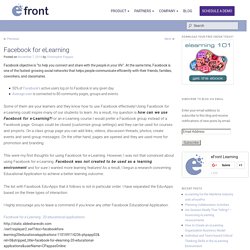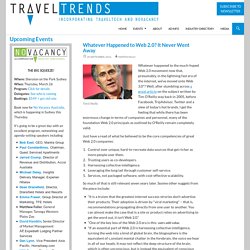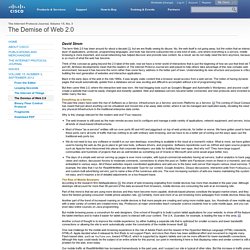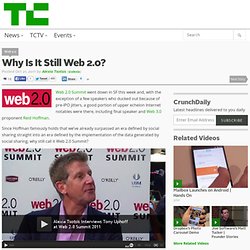

Building Online Learning Communities Through Facebook Connections. Facebook for eLearning. Facebook objective is “to help you connect and share with the people in your life“.

At the same time, Facebook is one of the fastest growing social networks that helps people communicate efficiently with their friends, families, coworkers, and classmates.50% of Facebook’s active users log on to Facebook in any given day.Average user is connected to 80 community pages, groups and events. Some of them are your learners and they know how to use Facebook effectively! Using Facebook for e-Learning could inspire many of our students to learn. As a result, my question is how can we use Facebook for e-Learning?
Facebook for e-Learning : 20 educational applications. What Is Web 2.0. By Tim O'Reilly 09/30/2005 Oct. 2009: Tim O'Reilly and John Battelle answer the question of "What's next for Web 2.0?

" in Web Squared: Web 2.0 Five Years On. The bursting of the dot-com bubble in the fall of 2001 marked a turning point for the web. Many people concluded that the web was overhyped, when in fact bubbles and consequent shakeouts appear to be a common feature of all technological revolutions. Shakeouts typically mark the point at which an ascendant technology is ready to take its place at center stage. The concept of "Web 2.0" began with a conference brainstorming session between O'Reilly and MediaLive International. In the year and a half since, the term "Web 2.0" has clearly taken hold, with more than 9.5 million citations in Google. Whatever Happened to Web 2.0? It Never Went Away. Whatever happened to the much-hyped Web 2.0 movement now that, presumably, in the lightning fast era of the internet, we've moved onto Web 3.0*?

Well, after stumbling across a great article on the subject written by Tim O'Reilly way back in 2005, before Facebook, TripAdvisor, Twitter and a slew of today's hot brands, I get the feeling that while there has been enormous change in terms of companies and personnel, many of the foundation Web 2.0 principals as outlined by O'Reilly remain completely valid. Just have a read of what he believed to be the core competencies of great Web 2.0 companies: Control over unique, hard-to-recreate data sources that get richer as more people user them.Trusting users as co-developers.Harnessing collective intelligence.Leveraging the long tail through customer self-service.Services, not packaged software, with cost-effective scalability. So much of that is still relevant seven years later. Soome other nuggets from the piece include: Is the term "Web 2.0" still relevant? The Demise of Web 2.0 - The Internet Protocol Journal, Volume 15, No. 3.
The term Web 2.0 has been around for about a decade [1], but we are finally seeing its disuse.

No, the web itself is not going away, but the notion that an interactive layer of applications, protocols, programming languages, and tools has become subsumed into a new kind of web—one where everything is a service, mobile browsing is more important, and social networking has helped discover and promote new content. As a result, we do not really need the term anymore, because it is so much of what the web has become. Think of this concept as going beyond the 2.0 label of the web: now we have a richer world of interactions that is just the beginning of how we use that tired old TCP port 80.
All these developments mean that the readers of The Internet Protocol Journal are well poised to help others take advantage of this new complex web environment, because it has become the norm rather than some fancy address in the better part of town. Everything as a Service. Why Is It Still Web 2.0? Web 2.0 Summit went down in SF this week and, with the exception of a few speakers who ducked out because of pre-IPO jitters, a good portion of upper echelon Internet notables were there, including final speaker and Web 3.0 proponent Reid Hoffman.

Since Hoffman famously holds that we’ve already surpassed an era defined by social sharing straight into an era defined by the implementation of the data generated by social sharing, why still call it Web 2.0 Summit? Curious, I spoke to Techweb CEO Tony Uphoff about a potential change in nomenclature for the conference, “What’s happened is that this particular event has become a brand,” he responded, “The average person that attends this doesn’t stop to think of Web 2.0 as a technical term — they think that this has become the gathering place for the Internet economy.”
Web 2.0 Not Going Away, Despite Criticism - Web 2.0.